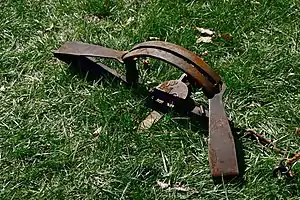tega
Galician
Etymology
From an older talega, from Andalusian Arabic تَعْلِيقَة (taʕlíqa, “hanged thing”). Doublet of taleiga and of teiga; cognate with Spanish talega.[1]
Pronunciation
- IPA(key): /ˈtɛɣa̝/
Noun
tega f (plural tegas)
- (units of measure) a traditional unit of dry measure, especially for grain, used in southern Galicia
References
- “teega” in Dicionario de Dicionarios do galego medieval, SLI - ILGA 2006-2012.
- “teega” in Xavier Varela Barreiro & Xavier Gómez Guinovart: Corpus Xelmírez - Corpus lingüístico da Galicia medieval. SLI / Grupo TALG / ILG, 2006-2016.
- “tega” in Dicionario de Dicionarios da lingua galega, SLI - ILGA 2006-2013.
- “tega” in Tesouro informatizado da lingua galega. Santiago: ILG.
- “tega” in Álvarez, Rosario (coord.): Tesouro do léxico patrimonial galego e portugués, Santiago de Compostela: Instituto da Lingua Galega.
- Corriente, Federico (2008), “taleca”, in Dictionary of Arabic and Allied Loanwords. Spanish, Portuguese, Catalan, Galician and Kindred Dialects (Handbook of Oriental Studies; 97), Leiden: Brill, →ISBN
Italian
Etymology
From Latin thēca, from Ancient Greek θήκη (thḗkē). Doublet of teca.
Swahili

tega
Verb
tega
- trap (to catch in a trap or traps; as, to trap foxes)
This Swahili entry was created from the translations listed at trap. It may be less reliable than other entries, and may be missing parts of speech or additional senses. Please also see tega in the Swahili Wiktionary. This notice will be removed when the entry is checked. (more information) July 2009
This article is issued from Wiktionary. The text is licensed under Creative Commons - Attribution - Sharealike. Additional terms may apply for the media files.